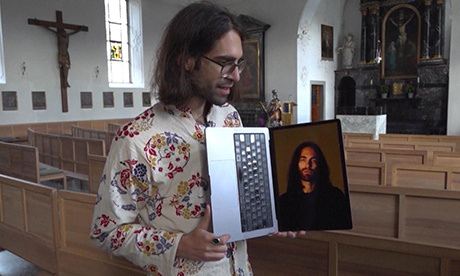The AI Jesus experiment has been deemed a success.
Nearly 300 visitors to the experiment completed surveys, with many describing the experience as thought-provoking or emotionally impactful.
Most visitors were aged 40 to 70, with Catholics reporting more positive reactions than Protestants.
“What was really interesting (was) to see that the people really talked with him in a serious way. They didn’t come to make jokes” said chapel theologian Marco Schmid, who spearheaded the project.
Schmid emphasised that the avatar was an artistic experiment, not a substitute for human confession or priestly interaction.
He was quick to point out that the “AI Jesus” — billed as a “Jesus-like” persona — was an artistic experiment to get people thinking about the intersection between the digital and the divine, not substitute for human interaction or sacramental confessions with a priest, nor was it intended to save pastoral resources.
The AI Jesus, modelled on GPT-4o, responded in multiple languages including German, English, French and Chinese. Visitors addressed issues ranging from solitude and suffering to questions about the Church’s stance on sexual abuse and homosexuality.
The exhibit hosted at Peter’s Chapel in Lucerne drew participants from diverse religious backgrounds including Christians, agnostics, Muslims and Buddhists.
Philipp Haslbauer, an IT specialist behind the project, explained “No specific safeguards were used, as GPT-4o generally handled controversial topics well”.
Online criticism
While many visitors praised the initiative, some criticism emerged online. There have been accusations of blasphemy and concerns about AI’s role in spirituality. Schmid, however, found value in the discussions the project sparked. He described it as a pilot initiative that helped engage people with questions about faith and technology.
Kenneth Cukier, an expert with the US-based nonprofit group AI and Faith, said that if “AI Jesus” helps people connect deeper to themselves and the world, it “has to be a good thing”.
However “the risk is that it pulls people, ultimately, farther away from that which is more meaningful, deeper and authentic in spirituality” advised Cukier.
Pope Francis has urged the ethical use of AI and called for international regulations to address its societal impact. The Vatican has also explored AI’s potential, appointing a Franciscan friar to study its implications.
Other parishes and researchers have expressed interest in the potential return of ‘AI Jesus’. Schmid said the project’s continuation requires reflection.
Sources
Additional reading
News category: World.




